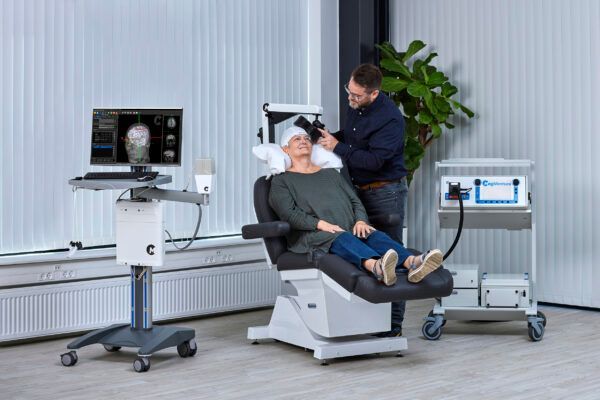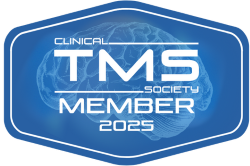
JOIN US! TMS Education Event - Tuesday, April 9th 5:30pm pst - Click to learn more!
TMS for PTSD: Healing From Trauma

What Is PTSD?
Post-traumatic stress disorder is a mental health condition that can develop after any extremely stressful, distressing, or frightening event. It may also develop after prolonged trauma. The condition is quite common, and about 6% of people will have PTSD at some point in their lives.
Causes of PTSD may include:
- Combat experiences
- Physical or sexual assault
- Domestic abuse
- Torture
- Witnessing a fatal accident
- Poor childbirth experiences
- Serious health problems
Certain people are at a higher risk than others of developing PTSD, including those who have dealt with depression or anxiety in the past. There may also be a genetic component involved, as many people with PTSD have at least one parent who also has a mental health condition.
Why Does PTSD Develop?
It’s not entirely clear why some people develop PTSD after a traumatic event while others don’t. Some experts think that PTSD develops as a way to protect you from further traumatic experiences. It’s thought that PTSD keeps you aware and alert so you don’t suffer through the same upsetting events again.
People with PTSD also tend to have a smaller hippocampus than those without the condition. This part of the brain controls emotions and memory. If it’s not working properly, your brain can’t process nightmares and flashbacks well, leading to irritability and increased anxiety.
Symptoms of PTSD
If you have PTSD, you might feel like you are “on edge” all the time. You may feel constantly moody and angry, causing you to lash out at family, friends, and coworkers. You might also be very jumpy. A sudden loud noise can be enough to trigger flashbacks of a traumatic event.
Other symptoms may include:
- Having trouble falling asleep and staying asleep, or experiencing frequent nightmares related to a traumatic event
- Avoiding anything that reminds you of the event (for instance, refusing to drive after a car accident or avoiding a store where you witnessed a robbery)
- Experiencing the same symptoms you did during the traumatic event, such as racing thoughts, sweating, and a rapid heartbeat
- Engaging in dangerous or reckless behaviors, such as drunk driving or excessive gambling
- Frequently feeling guilty, ashamed, or fearful
- Losing interest in activities you once loved
PTSD can affect children as well. They might exhibit symptoms such as:
- Acting out the frightening event during playtime
- Becoming more clingy with a parent or other caregiver
- Forgetting how to talk (in children younger than six)
- Wetting the bed
PTSD Can Be Difficult To Treat
One reason PTSD is hard to treat is that it’s an “invisible” condition. Those who grapple with PTSD symptoms may seem fine on the outside and often shy away from treatment to keep up appearances and avoid admitting that something is wrong.
PTSD can also make it hard to trust others. No matter how good a doctor’s or therapist’s intentions are, sufferers may be reluctant to open up to them and seek help.
Additionally, some symptoms of PTSD can mimic those of other mental health conditions. Doctors may prescribe drugs that cause serious side effects or simply don’t work at all.
What Is TMS for PTSD?
TMS is an alternative to drug-based treatments for PTSD. It’s a type of neurostimulation that uses magnetic pulses to target your brain’s dorsolateral prefrontal cortex (DLPFC).
It’s thought that these pulses can help “reset” the brain, thus reducing symptoms of PTSD. Most PTSD patients who undergo TMS report an increase in mood and a reduction of upsetting symptoms, such as flashbacks and nightmares.
TMS Treatment for PTSD
TMS treatments are performed in an outpatient setting. The most common approach to TMS for PTSD involves treatments once per day, five days per week, for six to eight weeks. This treatment approach has been shown to be highly effective, but patients with PTSD may find it difficult to keep up with the regimen because of the time commitment involved.
For patients who do not want to commit to a lengthy treatment schedule, Accelerated TMS may be a better option. With Accelerated TMS, we can condense your treatment from six weeks to just five days.
Accelerated TMS is similar to the traditional treatment described above. The main difference is that you’ll receive multiple treatments per day for a total of five days instead of getting one treatment daily for several weeks.
Other Treatment Options for PTSD
When combined with other treatments, TMS for PTSD can be incredibly effective. These other treatments may include:
- Exposure therapy: The goal of exposure therapy is to gradually acclimate you to something you’re afraid of over a long period. Eventually, your body will learn that it has nothing to fear.
- Cognitive behavioral therapy (CBT): During CBT, a therapist teaches you how to reframe negative thoughts in a positive way. For instance, it can help you get rid of thoughts like “The world is dangerous” and “I can’t trust anyone.”
- Eye Movement Desensitization and Reprocessing (EMDR): EMDR involves moving your eyes in a certain way while processing traumatic memories. This is a relatively new treatment (the first clinical trial studying EMDR was in 1989), but it’s been shown to be highly effective for people with PTSD.
- Mindfulness and relaxation techniques to help you learn how to manage stress and upsetting thoughts
- Journaling to put your feelings and thoughts on paper
- Getting good sleep, exercising regularly, and eating a healthy diet
Medications, such as selective serotonin reuptake inhibitors (SSRIs), may be helpful for some people as well. However, these medications can cause upsetting side effects for certain individuals. If your medications are causing side effects such as nausea, sleeplessness, headaches, or irritability, TMS for PTSD could be a good alternative for you.
What Other Conditions Can TMS Treat?
PTSD isn’t the only condition that TMS is helpful for. It’s also been shown to help with:
- Major depressive disorder (MDD), including treatment-resistant depression
- Obsessive-compulsive disorder (OCD)
- Migraines
- Smoking cessation
- Generalized Anxiety Disorder (GAD)
- Addictions
- Eating disorders
Researchers are currently investigating whether TMS may help treat other conditions, including:
- Alzheimer’s disease
- Stroke complications
- Traumatic brain injuries
- Schizophrenia
- Bipolar disorder
- Borderline personality disorder (BPD)
- Parkinson’s disease
- Fibromyalgia
Research in these areas is limited, but if you have any of the above conditions, you may see improvements by trying TMS.
Does Accelerated TMS for PTSD Really Work?
TMS for PTSD may sound too good to be true, but research thus far has been very promising. One meta-analysis of studies published in the journal Nature found that TMS “appears to significantly reduce core PTSD symptoms in patients with PTSD.” The meta-analysis also stated that TMS could be a good alternative treatment for people who show limited response to antidepressant medication and/or trauma-focused therapy.
Another study looked at TMS therapy for patients with PTSD and major depressive disorder, as these conditions frequently occur together. Patients received 36 sessions over the course of several weeks. The results showed that about one-third of patients experienced a major improvement in PTSD and depressive symptoms.
Yet another study published in the American Journal of Psychiatry looked at the effectiveness of TMS for war veterans. Researchers found that 70% of participants no longer met the criteria for PTSD once treatment was complete.
Is TMS Right for You?
TMS is as safe as it is effective. Most people who have this treatment show quick improvement and don’t experience any side effects. Some people may have mild headaches or scalp irritation, but these effects usually go away after a few sessions.
You may want to consider TMS if your PTSD is making it difficult for you to live a fulfilling life. TMS can be a good option if you’ve tried therapy or medication but haven’t yet experienced any robust results.
That said, talk to your TMS provider before starting treatment if you fall into any of these groups:
- You have a history of substance abuse
- You’ve suffered serious head trauma
- You’ve attempted suicide at least once in the past
- You’re pregnant or nursing
- You have cerebrovascular disease, epilepsy, dementia, or increased intracranial pressure
- You have a cochlear implant, implantable defibrillator, pacemaker, or stents
The following groups may not be good candidates for TMS:
- People who have implanted magnetic plates in their heads
- People who are at risk of having seizures
- People who have implanted electronic devices in their bodies
Why Choose Kind Health Group for TMS?
At Kind Health Group, you’ll get personalized, one-on-one TMS treatment. TMS won’t completely cure your PTSD, but it can help you feel much better so you can go back to living your normal life.
When you work with us, you’ll get:
- Access to an experienced team led by experts in the field of TMS
- Guidance on how to make positive lifestyle changes, such as eating a healthy diet, managing your stress, and getting good sleep
- Sessions with health coaches who walk with you on the path to recovery
- Dedicated follow-up during treatment and beyond
How To Get Started
If you’re interested in starting TMS for PTSD, getting help is simple. Here’s how it works:
- Before we begin treatment, we’ll want to ensure you have an official PTSD diagnosis from your doctor or therapist. You may have a condition other than PTSD, and if that’s the case, the treatment might not work as intended.
- Next, pick a reputable TMS provider. Kind Health Group is San Diego’s trusted TMS provider, and we offer a comprehensive approach to care. We go beyond TMS with personalized health coaching to help you make strides toward living a healthy and complete life.
- Once you’ve made your appointment, we’ll talk to you about the TMS process so you know exactly what to expect. We can answer questions about how long the treatment will last and when you might start to feel better.
- If you’re a good candidate for TMS, we’ll start treatment right away. We can complete accelerated TMS in five days, so you won’t have to commit to daily sessions over several weeks.
- Our service doesn’t end with your treatment. We will follow up with you for a minimum of one year to see how you’re feeling and evaluate whether TMS has been effective for your PTSD. We might also suggest complementary therapies, such as CBT or EMDR, if we think those will be helpful for you.
Talk With Our TMS Providers Now
Thanks to TMS for PTSD, you don’t need to live with depression, anxiety, flashbacks, and negative thoughts any longer. Our treatment is simple, drug-free, and highly effective for symptoms of PTSD.
If you’re ready to start your journey to recovery with comprehensive care by Kind Health Group, reach out to us at
(760) 840-5358
to make your appointment with a provider today. We also welcome you to take our quick quiz to find out if TMS for PTSD is right for you.

Meet the Author
Dr. Georgine Nanos, MD, MPH
Founder of Kind Health Group
If this is a life-threatening emergency, please call 911 or the National Suicide Prevention Lifeline














































